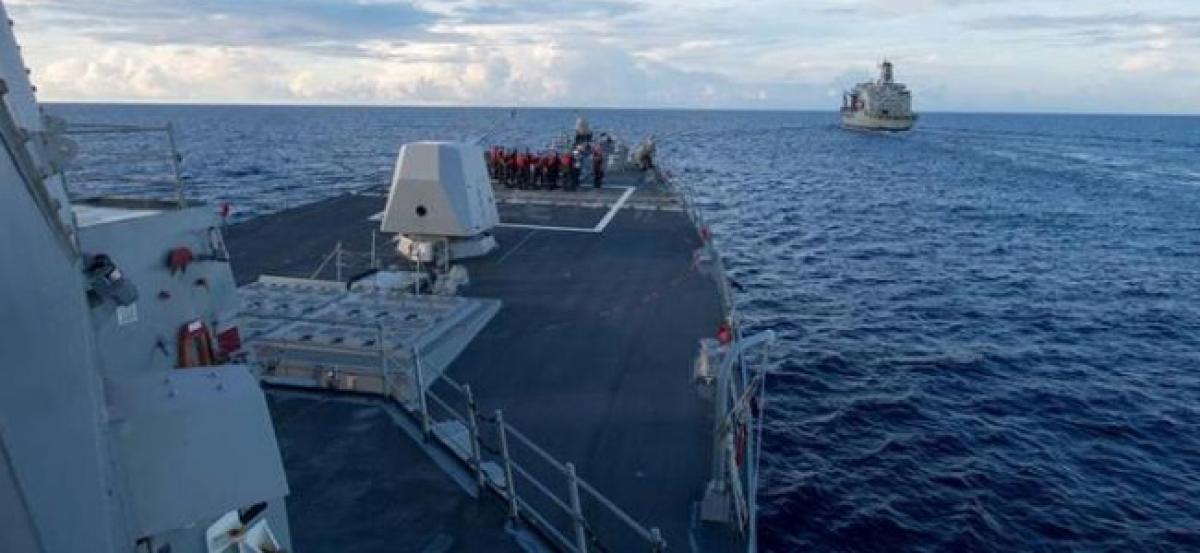Live
- Royaloak Furniture Announces Exciting Year-End Sale providing up to 70% off on all International Furniture & décor products
- Pakistani Girl Murdered in UK: Father and Stepmother Convicted in Sara Sharif Case
- Maha Kumbh Mela: Understanding Its Unique Significance
- YouTube Introduces Real-Time Multiplayer Gaming with Playables
- AUS W vs IND W 3rd ODI: Smriti Mandhana Makes History with Stunning Century in Perth
- CM Revanth Reddy Congratulates Telangana Candidates Advancing to UPSC Interviews
- Collector Inspires Students to Excel Through Discipline, Hard Work, and Smart Work
- District Collector Directs Officials to Expedite Paddy Procurement Process
- SP T. Srinivas Rao Inaugurates State-of-the-Art Volleyball Court for Police Personnel in Jogulamba Gadwal
- Geeta Jayanti Celebrations Organized at Maldakal Thimmappa Swamy Temple
Just In

Amid a global outcry over Donald Trump\'s executive order barring the entry of legal immigrants and refugees from seven Muslim-majority nations into the US, Indian techies and students are anxious about the possibility of the new US president imposing curbs on the visas that keep them in country.
New Delhi: Amid a global outcry over Donald Trump's executive order barring the entry of legal immigrants and refugees from seven Muslim-majority nations into the US, Indian techies and students are anxious about the possibility of the new US president imposing curbs on the visas that keep them in country.
The Trump administration is believed to be mulling new diktats on students of science and technology and the spouses of H-1B visa holders, a large chunk of which is used by the Indian IT industry.
It is feared that the US administration could make life more difficult for legal immigrants to the US who are on H-1B visas as a new bill on the issue is in the final stage of approval.
According to leaked drafts of four executive orders said to be under consideration by the White House, one deals with "Limiting legal immigration: Protecting American Jobs and Workers by Strengthening the Integrity of Foreign Worker Visa Programs," reported vox.com.
The draft seeks "improved monitoring of foreign students", allows for "site visits" of workplaces that employ L1 visa holders (L1 is another visa category used by Indian techies) by US Department of Homeland Security officials.
The draft reverses the Obama administration's decision to allow spouses of H1B Visa holders to work in that country. 90 per cent of Indian technology workers use H1B visas. L1 visas are for shorter period and are often used by top management.
The order, if signed into law, will also reverse the Optional Practical Training (OPT) extension for STEM (Science, Technology, Engineering and Mathematics) students that the earlier administration had mooted in late 2015.
OPT extensions allowed graduates with STEM degrees to stay in the US for as much as three years after graduating from college. The new order will curtail that period, hurting the future plans of 165,918 Indian students in the US.
Indians comprise the second largest ethnic group after the Chinese when it comes international student enrolment in the US, according to the Institute of International Education.
If implemented, the executive order could seriously hit the movement of students and skilled employees from India to the US.
"This president is proving to be very determined to close off the US from foreign labour. He means what he says and believes in what he is doing," said Phil Fersht, CEO, HfS Research. "The days of free movement of talent and labour with the US are going to be very challenged while this man is in power," Fersht added.
The H-1B visa program which allows highly skilled workers to travel to the US - has been a cornerstone of Indian IT's success for almost two decades now. As the future of the visa program hangs in the balance, a person aware of the thinking of the Indian technology services companies said that they would want to get their hands on as many visas as possible before any long term prohibitions set in.
"Assuming no executive orders are passed regarding the H-1B visas by April 1, when the visa lottery opens, everybody would latch on to what is currently available. Next year, you don't know whether you will get a visa or not," said this person.
Even though Friday's executive order may not have an immediate, direct impact on Indian IT, many Indian IT firms have sizeable numbers of employees on their rolls who are Muslims. Some of these employees may feel challenged going for onshore assignments to the US. The Indian IT companies should be prepared for a phase of uncertainty for the next 3-6 months, experts say.

© 2024 Hyderabad Media House Limited/The Hans India. All rights reserved. Powered by hocalwire.com







